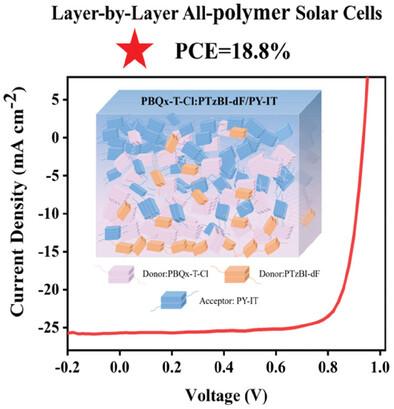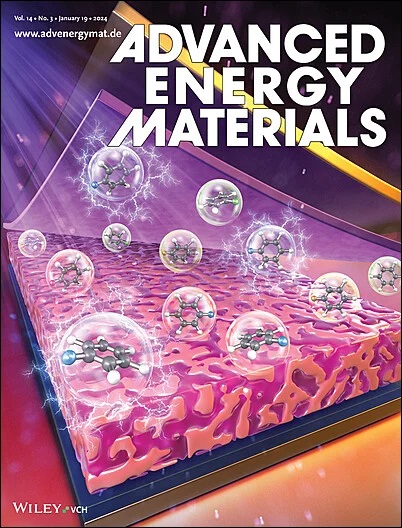Layer-by-Layer All-Polymer Solar Cells Approaching 19% with Dual-Donor Modulation of an Interpenetrating Network
IF 24.4
1区 材料科学
Q1 CHEMISTRY, PHYSICAL
引用次数: 0
Abstract
All-polymer systems are promising for commercial applications because the lower diffusivity of polymers helps to inhibit the large-scaled phase separation and obtain excellent stability. Achieving a fine-tuned morphology of the active layer with an appropriate vertical phase has long been a major goal in obtaining efficient all-polymer solar cells (all-PSCs). Herein, through the synergistic effect of layer-by-layer (LBL) structure and dual donor strategy, high performance and stable all-PSCs are prepared by constructing an interpenetrating network. The introduction of the third component PTzBI-dF suppresses excessive aggregation and reduces exciton recombination. The formation of a favorable p-i-n structure helps to adjust the vertical phase distribution and improve stability. Ultimately, through the fine optimization, PBQx-T-Cl:PTzBI-dF/PY-IT achieves a high PCE of 18.83%. This research demonstrates a simple and effective way to construct high-performance OSCs by desirable active layer morphology and vertical phase distribution.

逐层全聚合物太阳能电池通过互穿网络双供体调制实现接近 19% 的发电量
全聚合物系统具有良好的商业应用前景,因为聚合物的扩散性较低,有助于抑制大尺度相分离并获得出色的稳定性。长期以来,实现具有适当垂直相的活性层形态微调一直是获得高效全聚合物太阳能电池(all-PSCs)的主要目标。在这里,通过逐层(LBL)结构和双供体策略的协同效应,通过构建一个相互渗透的网络制备出了高性能和稳定的全聚合物太阳能电池。第三种成分 PTzBI-dF 的引入抑制了过度聚集并减少了激子重组。有利的 pi-n 结构的形成有助于调整垂直相分布并提高稳定性。最终,通过精细优化,PBQx-T-Cl:PTzBI-dF/PY-IT 实现了 18.83% 的高 PCE。这项研究通过理想的活性层形态和垂直相分布,展示了一种构建高性能 OSC 的简单而有效的方法。
本文章由计算机程序翻译,如有差异,请以英文原文为准。
求助全文
约1分钟内获得全文
求助全文
来源期刊

Advanced Energy Materials
CHEMISTRY, PHYSICAL-ENERGY & FUELS
CiteScore
41.90
自引率
4.00%
发文量
889
审稿时长
1.4 months
期刊介绍:
Established in 2011, Advanced Energy Materials is an international, interdisciplinary, English-language journal that focuses on materials used in energy harvesting, conversion, and storage. It is regarded as a top-quality journal alongside Advanced Materials, Advanced Functional Materials, and Small.
With a 2022 Impact Factor of 27.8, Advanced Energy Materials is considered a prime source for the best energy-related research. The journal covers a wide range of topics in energy-related research, including organic and inorganic photovoltaics, batteries and supercapacitors, fuel cells, hydrogen generation and storage, thermoelectrics, water splitting and photocatalysis, solar fuels and thermosolar power, magnetocalorics, and piezoelectronics.
The readership of Advanced Energy Materials includes materials scientists, chemists, physicists, and engineers in both academia and industry. The journal is indexed in various databases and collections, such as Advanced Technologies & Aerospace Database, FIZ Karlsruhe, INSPEC (IET), Science Citation Index Expanded, Technology Collection, and Web of Science, among others.
 求助内容:
求助内容: 应助结果提醒方式:
应助结果提醒方式:


